Unit 1 Me and My Class-Lesson 3 课件(共31张PPT)
文档属性
| 名称 | Unit 1 Me and My Class-Lesson 3 课件(共31张PPT) |
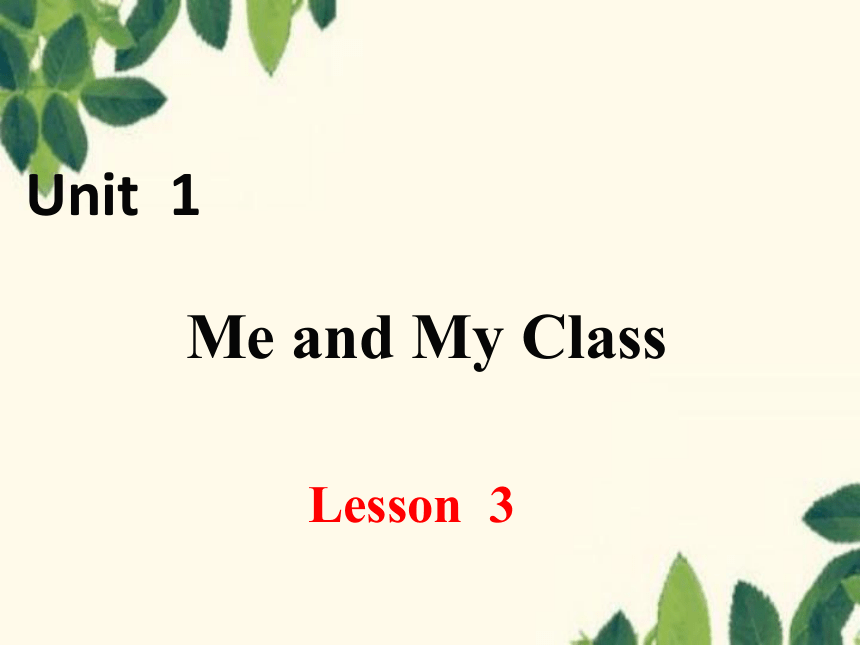
|
|
| 格式 | ppt | ||
| 文件大小 | 1.8MB | ||
| 资源类型 | 教案 | ||
| 版本资源 | 冀教版 | ||
| 科目 | 英语 | ||
| 更新时间 | 2022-08-16 11:28:28 | ||
图片预览

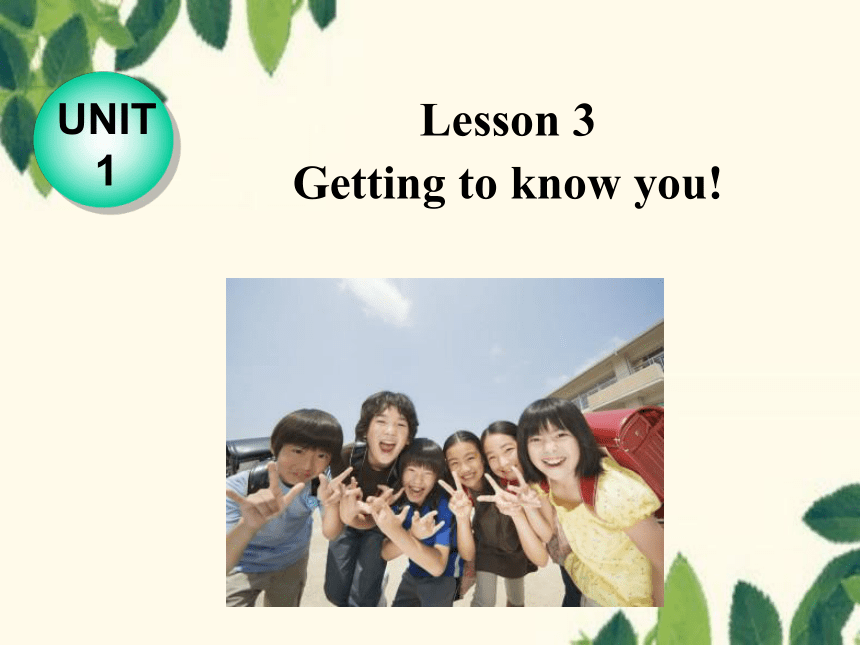
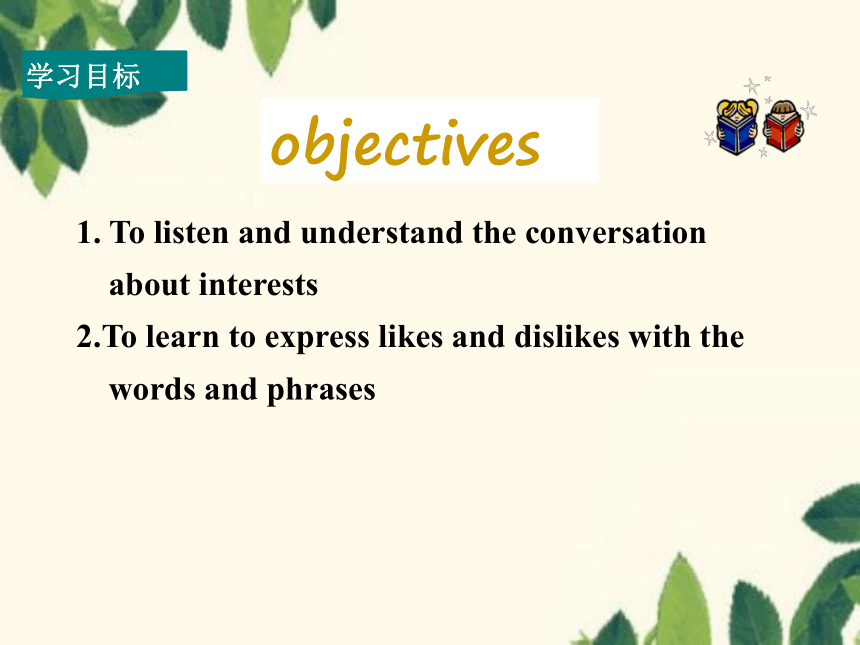

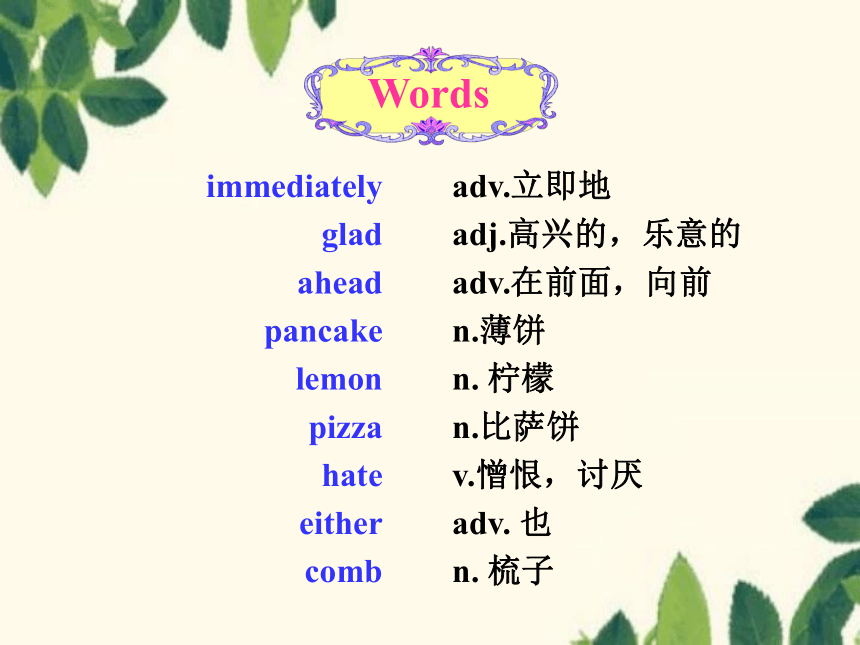
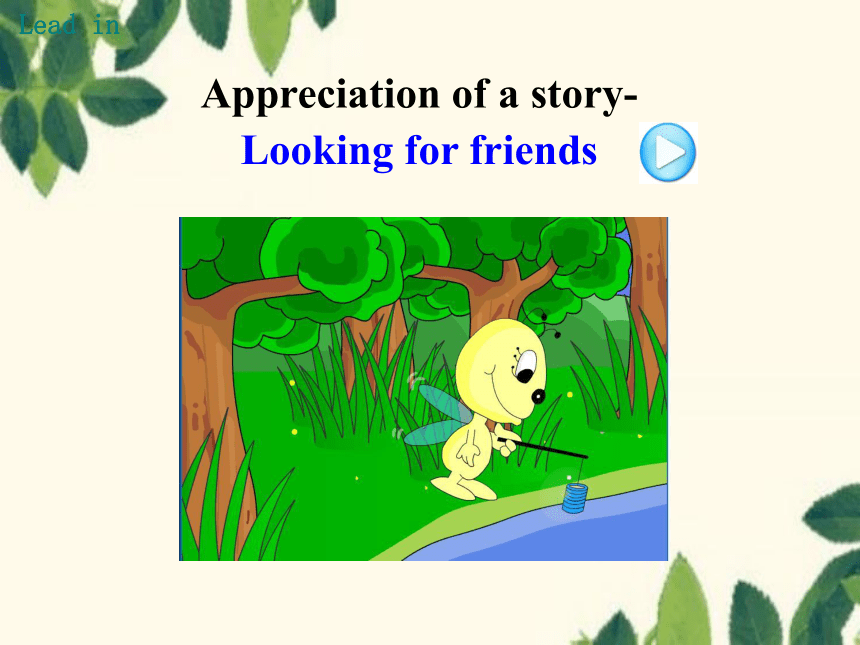
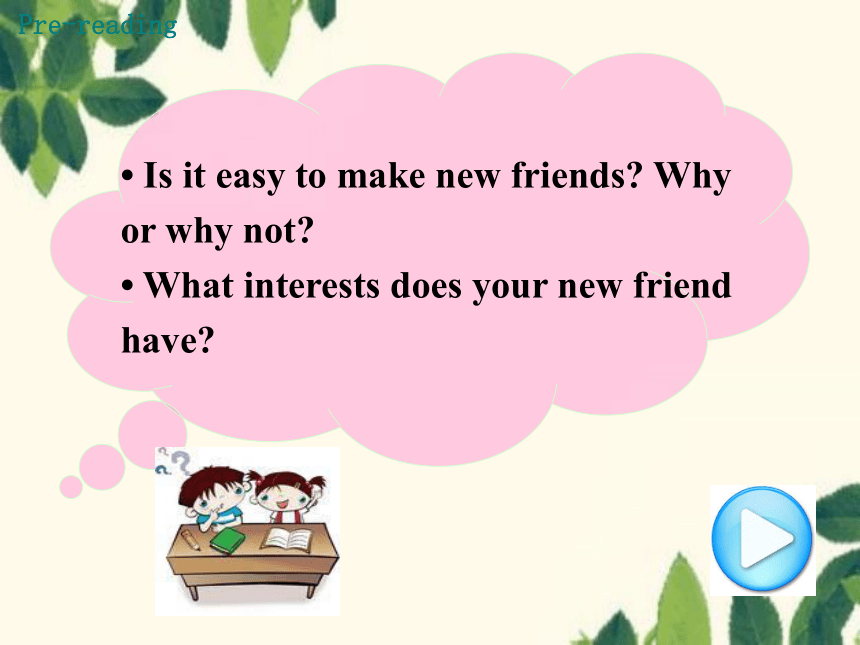
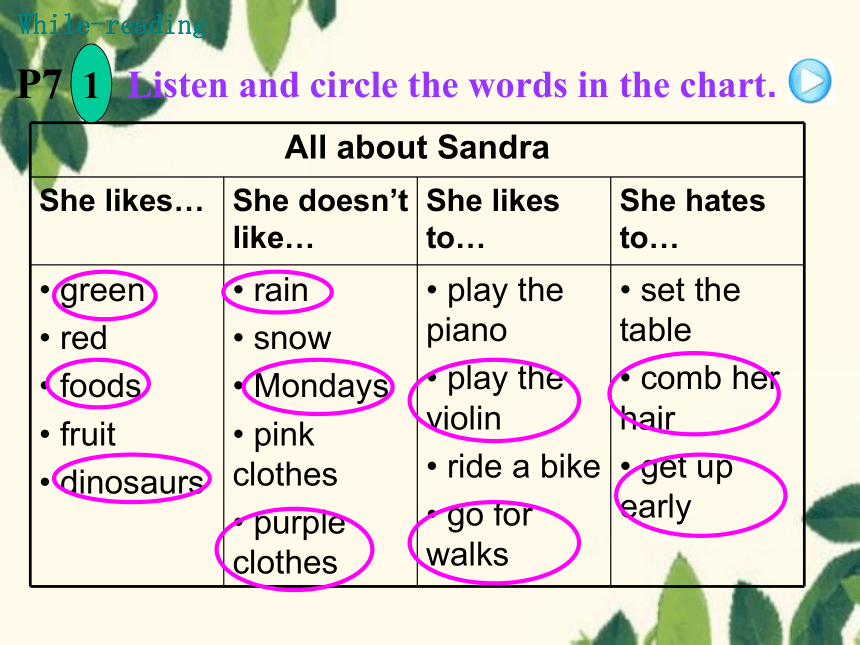

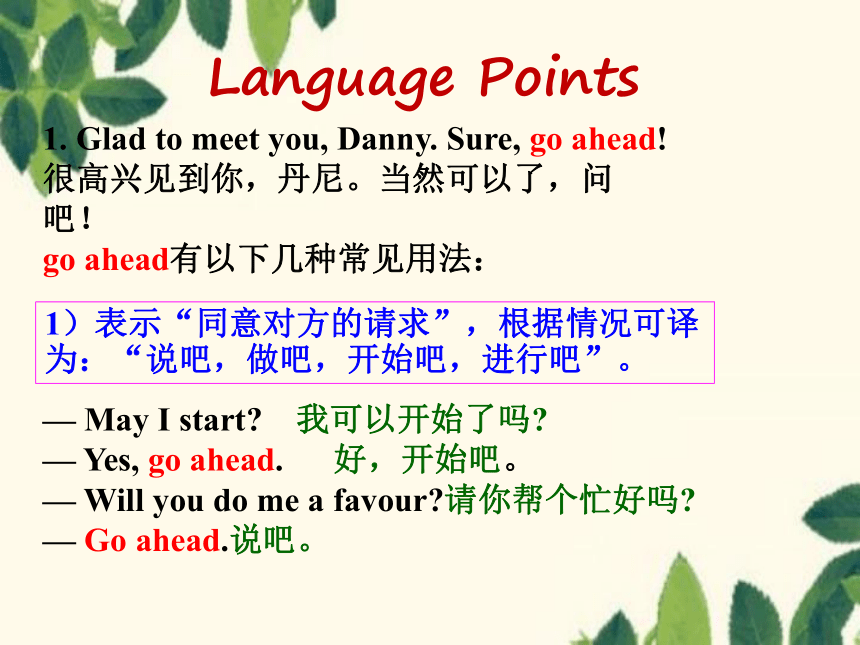

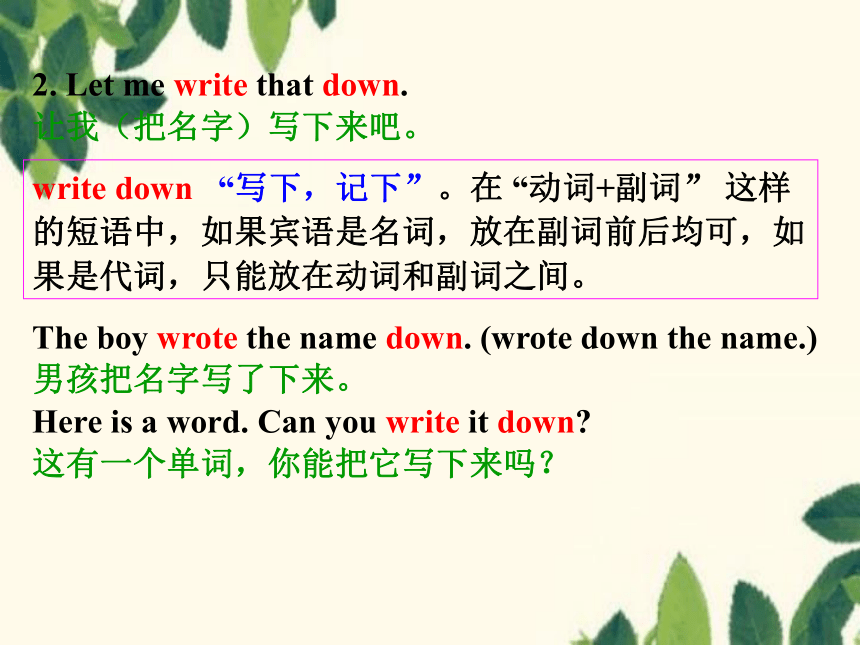
文档简介
(共31张PPT)
Lesson 3
Me and My Class
Unit 1
UNIT
1
Lesson 3
Getting to know you!
学习目标
objectives
1. To listen and understand the conversation about interests
2.To learn to express likes and dislikes with the words and phrases
Words:
immediately, pancake, lemon, pizza, hate, either
Phrases:
go ahead play the violin like to do
What colour do you like
What do you hate
Patterns:
adv.立即地
adj.高兴的,乐意的
adv.在前面,向前
n.薄饼
n. 柠檬
n.比萨饼
v.憎恨,讨厌
adv. 也
n. 梳子
Words
immediately
glad
ahead
pancake
lemon
pizza
hate
either
comb
Appreciation of a story-
Looking for friends
Lead in
Is it easy to make new friends Why or why not
What interests does your new friend have
Pre-reading
Listen and circle the words in the chart.
All about Sandra
She likes… She doesn’t like… She likes to… She hates to…
green
red
foods
fruit
dinosaurs rain
snow
Mondays
pink clothes
purple clothes play the piano
play the violin
ride a bike
go for walks set the table
comb her hair
get up early
P7
1
While-reading
Read the lesson and answer the questions.
1. What task did Ms. Cox give to the class
2. How did Danny feel about the interview
3. What questions did Danny ask Sandra
2
1. Ms. Cox asked the class to talk about their interests and then write down their answers.
2. Danny was a little nervous.
3. The questions are: What is your name What colour do you like What foods do you like to eat What do you hate What do you like to do after school What do you hate to do Do you like dinosaurs
1. Glad to meet you, Danny. Sure, go ahead!
很高兴见到你,丹尼。当然可以了,问
吧!
go ahead有以下几种常见用法:
— May I start 我可以开始了吗
— Yes, go ahead. 好,开始吧。
— Will you do me a favour 请你帮个忙好吗
— Go ahead.说吧。
1)表示“同意对方的请求”,根据情况可译
为:“说吧,做吧,开始吧,进行吧”。
Language Points
Go ahead. We’re all listening.
继续讲吧,我们都在听着呢!
Go ahead, what are you waiting for
往前走呀,你在等什么呢
You go ahead and tell him that we’re coming.
你先走一步,告诉他我们就来。
You go ahead. I’ll join you soon.
你们先开始,我一会儿就来(和你们一块干)。
2)表示“请对方继续说或做”等,可译为:“继续……吧”。
3)表示“请对方先走或先做某事”, 可译为:“你先走一步,你先请”。
2. Let me write that down.
让我(把名字)写下来吧。
The boy wrote the name down. (wrote down the name.)
男孩把名字写了下来。
Here is a word. Can you write it down
这有一个单词,你能把它写下来吗?
write down “写下,记下”。在 “动词+副词” 这样的短语中,如果宾语是名词,放在副词前后均可,如果是代词,只能放在动词和副词之间。
3. I love to eat many different foods, but I like donuts best.
我喜欢吃各种不同的食物,但是我最喜欢吃的是面包圈。
— What do sheep like best
绵羊最喜欢什么?
— Grass, I think. 我想是青草。
like…best 最喜欢……
like…better 较喜欢
like…very much 很喜欢……
like… a little 有点喜欢……
don’t (doesn’t) like…at all 根本不喜欢…
4. I don’t like rain either.
我也不喜欢下雨。
I am a driver. She is also a driver. /She is a driver, too.
我是司机,她也是司机。
Danny doesn’t like blue and I don’t like blue either.
丹尼不喜欢蓝色,我也不喜欢蓝色。
either, also, too作副词,意思是“也”,但用法有区别:also和too都用于肯定句,too一般放在句尾(有时也放句中),also放句中,either用于否定句,放在句尾。
You can park on either side of the street.
这条街两边都可以停车。
You can keep either of the photos.
你可以保留这两张照片中的任何一张。
I’m going to buy either a camera or a DVD player with the money.
我打算用这笔钱买一台照相机或者DVD。
either还可以作代词,表示“(两者中)任何一个”。
either…or…表示“要么……要么, 或者……或者”。
5. I also like to go for walks.
我还喜欢散步。
People in China love to go for walks after supper.
中国人喜欢晚饭后散散步。
I like to go for walks with my family.
我喜欢和我的家人一起去散步。
go (out) for a walk/walks 去散步
6. I have one more question.
我还有一个问题。
Would you like one more cup of coffee
你想再要一杯咖啡吗?
We have three more/another three hours to finish the work.
我们还有三个小时的时间来完成这份工作。
one more “另一个”,相当于another。“还有几个”的表达方法,可用“数字+more”或“another+数字”。
1. Role play the conversation in groups;
2. Role play the conversation in front of the class
Let’s see which group does the best.
Post-reading
—What food do you like to eat
—I like _____ many different food, but
I like donuts best.
to eat
Look and say
—What about you
— I like grapes, ________, ice cream, ______, ______ and hot dogs.
pancakes
lemons
pizza
—______________________, Sandra
—I like pink.
What colour do you like
—What do you like to do after school
— I like to _____________and I also
like to go for walks.
play the violin
她讨厌摆桌子。
She ________ set the table.
hates to
Fill in the blanks with the words or phrase in the box.
hate glad go ahead either
1. A: Do you mind if I open the window
B: No, ________.
2. I ____ going to the movie theatre alone.
3. A: I can’t swim.
B: I can’t swim ________.
4. After travelling all summer, I was _____
to come home.
go ahead
hate
either
glad
3
LET’S MAKE A CHART!
Learn something new about your classmates. Talk to them! Here are some questions you can ask:
What things do you like/hate
What do you like/hate to do Talk to three or four of your classmates. Write down their answers in a chart.
Time for reflection
go ahead
write down
go for walks
What colour do you like
What do you hate
向前,先走
写下,记下
散步
你喜欢什么颜色
你讨厌什么?
Practice
Practice
1. I hate ________________ (拉小提琴).
He doesn’t like playing it, _____ (也).
2. Danny _______ (喜爱) eat donuts best.
3. Sandra _______ (讨厌) comb her hair.
4. Lucy often ____________ (起床) early. She often _____________ (去散步) in the morning.
Ⅰ.根据汉语提示填空。
playing the violin
either
loves to
hates to
gets out of bed
goes for walks
Ⅱ. 从方框中选择恰当的单词或短语填空。
either, immediately, a little,
play the violin, go ahead
You look _______ nervous. What’s wrong with you
2. — Can I sit here for a rest
— Of course. _________.
3. My sister could ______________when
she was seven.
4. The students went back to their seats
___________when the teacher came in.
5. I don’t like grapes. My good friend Bob
doesn’t like them, _______.
a little
Go ahead
play the violin
immediately
either
Ⅲ. 根据汉语提示完成句子,每空一词。
1. He ____________(写下) my telephone
number just now.
2. Danny looks sad. Let’s go to _______
(与……谈话) him.
3. The old man _____________(去散步)
every day.
4. Lisa’s grandma often helps her ________
_____(梳头).
5. Jack hates to ____________(起床) early
every morning.
wrote down
talk to
goes for walks
comb her
hair
get out of bed
Preview the words and expressions in Lesson 4.
Write a short passage about a classmate
using all the information you collected about him or her in your chart: “ Getting to Know_______”.
Homework
Lesson 3
Me and My Class
Unit 1
UNIT
1
Lesson 3
Getting to know you!
学习目标
objectives
1. To listen and understand the conversation about interests
2.To learn to express likes and dislikes with the words and phrases
Words:
immediately, pancake, lemon, pizza, hate, either
Phrases:
go ahead play the violin like to do
What colour do you like
What do you hate
Patterns:
adv.立即地
adj.高兴的,乐意的
adv.在前面,向前
n.薄饼
n. 柠檬
n.比萨饼
v.憎恨,讨厌
adv. 也
n. 梳子
Words
immediately
glad
ahead
pancake
lemon
pizza
hate
either
comb
Appreciation of a story-
Looking for friends
Lead in
Is it easy to make new friends Why or why not
What interests does your new friend have
Pre-reading
Listen and circle the words in the chart.
All about Sandra
She likes… She doesn’t like… She likes to… She hates to…
green
red
foods
fruit
dinosaurs rain
snow
Mondays
pink clothes
purple clothes play the piano
play the violin
ride a bike
go for walks set the table
comb her hair
get up early
P7
1
While-reading
Read the lesson and answer the questions.
1. What task did Ms. Cox give to the class
2. How did Danny feel about the interview
3. What questions did Danny ask Sandra
2
1. Ms. Cox asked the class to talk about their interests and then write down their answers.
2. Danny was a little nervous.
3. The questions are: What is your name What colour do you like What foods do you like to eat What do you hate What do you like to do after school What do you hate to do Do you like dinosaurs
1. Glad to meet you, Danny. Sure, go ahead!
很高兴见到你,丹尼。当然可以了,问
吧!
go ahead有以下几种常见用法:
— May I start 我可以开始了吗
— Yes, go ahead. 好,开始吧。
— Will you do me a favour 请你帮个忙好吗
— Go ahead.说吧。
1)表示“同意对方的请求”,根据情况可译
为:“说吧,做吧,开始吧,进行吧”。
Language Points
Go ahead. We’re all listening.
继续讲吧,我们都在听着呢!
Go ahead, what are you waiting for
往前走呀,你在等什么呢
You go ahead and tell him that we’re coming.
你先走一步,告诉他我们就来。
You go ahead. I’ll join you soon.
你们先开始,我一会儿就来(和你们一块干)。
2)表示“请对方继续说或做”等,可译为:“继续……吧”。
3)表示“请对方先走或先做某事”, 可译为:“你先走一步,你先请”。
2. Let me write that down.
让我(把名字)写下来吧。
The boy wrote the name down. (wrote down the name.)
男孩把名字写了下来。
Here is a word. Can you write it down
这有一个单词,你能把它写下来吗?
write down “写下,记下”。在 “动词+副词” 这样的短语中,如果宾语是名词,放在副词前后均可,如果是代词,只能放在动词和副词之间。
3. I love to eat many different foods, but I like donuts best.
我喜欢吃各种不同的食物,但是我最喜欢吃的是面包圈。
— What do sheep like best
绵羊最喜欢什么?
— Grass, I think. 我想是青草。
like…best 最喜欢……
like…better 较喜欢
like…very much 很喜欢……
like… a little 有点喜欢……
don’t (doesn’t) like…at all 根本不喜欢…
4. I don’t like rain either.
我也不喜欢下雨。
I am a driver. She is also a driver. /She is a driver, too.
我是司机,她也是司机。
Danny doesn’t like blue and I don’t like blue either.
丹尼不喜欢蓝色,我也不喜欢蓝色。
either, also, too作副词,意思是“也”,但用法有区别:also和too都用于肯定句,too一般放在句尾(有时也放句中),also放句中,either用于否定句,放在句尾。
You can park on either side of the street.
这条街两边都可以停车。
You can keep either of the photos.
你可以保留这两张照片中的任何一张。
I’m going to buy either a camera or a DVD player with the money.
我打算用这笔钱买一台照相机或者DVD。
either还可以作代词,表示“(两者中)任何一个”。
either…or…表示“要么……要么, 或者……或者”。
5. I also like to go for walks.
我还喜欢散步。
People in China love to go for walks after supper.
中国人喜欢晚饭后散散步。
I like to go for walks with my family.
我喜欢和我的家人一起去散步。
go (out) for a walk/walks 去散步
6. I have one more question.
我还有一个问题。
Would you like one more cup of coffee
你想再要一杯咖啡吗?
We have three more/another three hours to finish the work.
我们还有三个小时的时间来完成这份工作。
one more “另一个”,相当于another。“还有几个”的表达方法,可用“数字+more”或“another+数字”。
1. Role play the conversation in groups;
2. Role play the conversation in front of the class
Let’s see which group does the best.
Post-reading
—What food do you like to eat
—I like _____ many different food, but
I like donuts best.
to eat
Look and say
—What about you
— I like grapes, ________, ice cream, ______, ______ and hot dogs.
pancakes
lemons
pizza
—______________________, Sandra
—I like pink.
What colour do you like
—What do you like to do after school
— I like to _____________and I also
like to go for walks.
play the violin
她讨厌摆桌子。
She ________ set the table.
hates to
Fill in the blanks with the words or phrase in the box.
hate glad go ahead either
1. A: Do you mind if I open the window
B: No, ________.
2. I ____ going to the movie theatre alone.
3. A: I can’t swim.
B: I can’t swim ________.
4. After travelling all summer, I was _____
to come home.
go ahead
hate
either
glad
3
LET’S MAKE A CHART!
Learn something new about your classmates. Talk to them! Here are some questions you can ask:
What things do you like/hate
What do you like/hate to do Talk to three or four of your classmates. Write down their answers in a chart.
Time for reflection
go ahead
write down
go for walks
What colour do you like
What do you hate
向前,先走
写下,记下
散步
你喜欢什么颜色
你讨厌什么?
Practice
Practice
1. I hate ________________ (拉小提琴).
He doesn’t like playing it, _____ (也).
2. Danny _______ (喜爱) eat donuts best.
3. Sandra _______ (讨厌) comb her hair.
4. Lucy often ____________ (起床) early. She often _____________ (去散步) in the morning.
Ⅰ.根据汉语提示填空。
playing the violin
either
loves to
hates to
gets out of bed
goes for walks
Ⅱ. 从方框中选择恰当的单词或短语填空。
either, immediately, a little,
play the violin, go ahead
You look _______ nervous. What’s wrong with you
2. — Can I sit here for a rest
— Of course. _________.
3. My sister could ______________when
she was seven.
4. The students went back to their seats
___________when the teacher came in.
5. I don’t like grapes. My good friend Bob
doesn’t like them, _______.
a little
Go ahead
play the violin
immediately
either
Ⅲ. 根据汉语提示完成句子,每空一词。
1. He ____________(写下) my telephone
number just now.
2. Danny looks sad. Let’s go to _______
(与……谈话) him.
3. The old man _____________(去散步)
every day.
4. Lisa’s grandma often helps her ________
_____(梳头).
5. Jack hates to ____________(起床) early
every morning.
wrote down
talk to
goes for walks
comb her
hair
get out of bed
Preview the words and expressions in Lesson 4.
Write a short passage about a classmate
using all the information you collected about him or her in your chart: “ Getting to Know_______”.
Homework
同课章节目录
- Unit 1 Me and My Class
- Lesson 1 Back to School!
- Lesson 2 Many Faces, One Picture
- Lesson 3 Getting to Know You!
- Lesson 4 Best Friends
- Lesson 5 Meet Ms. Liu
- Lesson 6 Jenny's Week
- Unit 2 My Favourite School Subject
- Lesson 7 Don't Be Late for Class!
- Lesson 8 E-mail Helpers!
- Lesson 9 I Don't Want to Miss Geography !
- Lesson 10 Looking for Lisa
- Lesson 11 Lily Learns about China !
- Lesson 12 Karen's Hair Stood Up!
- Unit Review
- Unit 3 Families Celebrate Togethe
- Lesson 13 I Love Autumn
- Lesson 14 Happy Memories
- Lesson 15 A Present for Li Ming!
- Lesson 16 Happy Thanksgiving!
- Lesson 17 Presents from Canada!
- Lesson 18 Li Ming's Birthday
- Unit Review
- Unit 4 My Neighbourhood
- Lesson 19 The Best Neighourhood
- Lesson 20 No Stopping!
- Lesson 21 Eat a Donut and Turn Right
- Lesson 22 I Like My Neighbourhood
- Lesson 23 People in My Neighbourhood
- Lesson 24 I Need a Map!
- Unit Review
- Unit 5 My Future
- Lesson 25 I Want to Be a Teacher!
- Lesson 26 What Will I Be ?
- Lesson 27 What's Your Advice?
- Lesson 28 Rich or Poor? It Doesn't Matter!
- Lesson 29 Our Ambitions and Dreams
- Lesson 30 A Famous Friend?
- Unit Review
- Unit 6 Go With Transportation !
- Lesson 31 How Do You Travel ?
- Lesson 32 Trains Go Faster !
- Lesson 33 Life on Wheels
- Lesson 34 Flying Donuts
- Lesson 35 Future Transportation
- Lesson 36 Clean Cars ?
- Unit Review
- Unit 7 Enjoy Your Hobby
- Lesson 37 What's Your Hobby ?
- Lesson 38 Hobbies Are Fun!
- Lesson 39 Danny's Hobby
- Lesson 40 What's Paul's Hobby?
- Lesson 41 Show and Tell!
- Lesson 42 The New Club
- Unit Review
- Unit 8 Celebrating Me
- Lesson 43 What Makes You Unique?
- Lesson 44 Georgia Plays Basketball
- Lesson 45 Be Yourself !
- Lesson 46 My Dream
- Lesson 47 I Made It !
- Lesson 48 Li Ming's Report
- Unit Review
